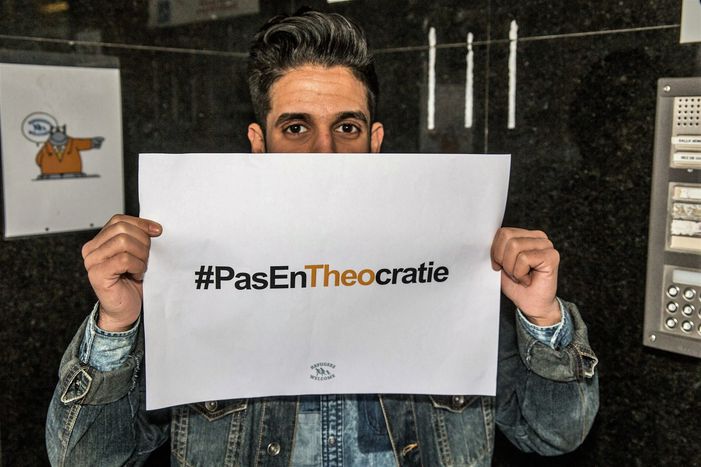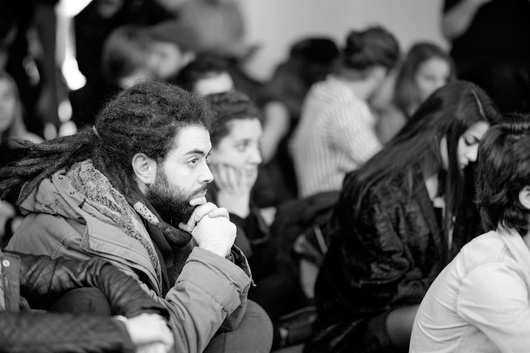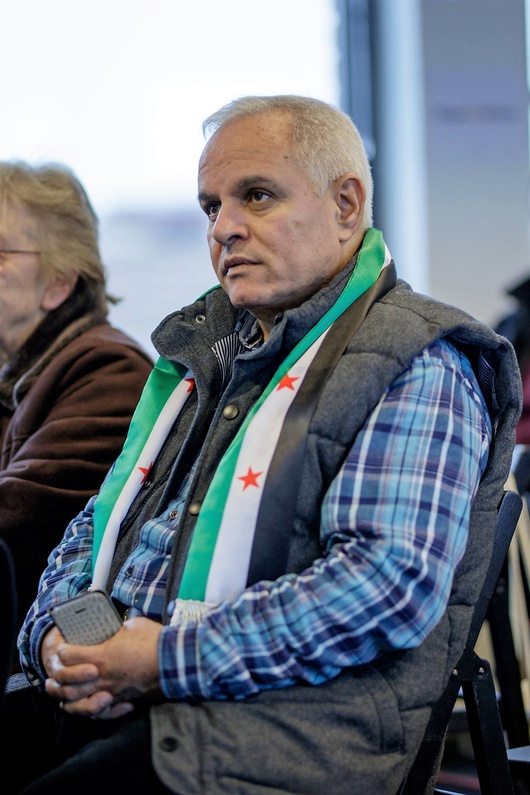
Syria Day: We must continue to help the population of Syria
Published on
Translation by:
Lucy ChadwickOn 10th December, the New Maximilian Hall in Brussels opened its doors to those who wanted to find out more about the situation in Syria. It was an opportunity to think about a population who are exhausted by a long war and lack of outlook. Café Babel has collected some accounts from people who fled the horrors of this conflict.
“My father says that life is like a tree: sometimes it blossoms, and sometimes it is completely bare” we were told in perfect English by Hamza, a Syrian in his 20s. “We were rich in Syria. My father had several businesses. He arrived in Europe using a fake Hungarian passport, which he had paid $1700 for. And now in Belgium, he is doing the same job as his workmen are doing back in Syria.”
Would you prefer to risk your life every day, or to risk it just once but lose all your dignity if you survive? “Lots of people are crying today. They cried yesterday too because they feared dying at any moment. And today they are crying because they have to leave their country” Jared Malsin wrote a short time ago when discussing Aleppo in The Time magazine. (VOL 188, NO 27-28/2016).
Attempting to recount a day in the life of a Syrian to someone who hasn’t lived through it is a difficult task. Even if it’s quite easy to recount the events, it’s impossible to recreate the emotions. We have been actively discussing the refugee crisis for several years, and even more so since the civil war in Syria escalated in 2011, but we haven’t, or have barely, spoken about the stories and lives of individuals. And we almost certainly never will. We can discuss the politics of asylum and integrating and welcoming refugees. But putting a face and an identity to the intangible figures we hear being talked about day in day out, is much more difficult. 
It is for this reason that the civic platform “Support for Refugees”, an initiative started in 2015 in response to the migrant crisis to provide individual support to refugees, organised this event on 10th December. A day of communion, dialogue, discussion and stories. Because even if the situation hasn’t changed in five years’ time, we need to continue to testify, to tell these stories of a life which could have been ours. These debates were however tinted with frustration, as Theo Francken, Secretary of state for Asylum and Migration in Belgium had promised to attend the event, but never showed up. The same Theo Francken who had recently created a scandal by refusing to give a humanitarian visa to a Syrian family. (http://bit.ly/2is0eOJ) (In French).
The event opened with a presentation about the situation in Aleppo, where hundreds of thousands of civilians are still succumbing to the atrocities of war. Aleppo, the symbol of rebel resistance to the Assad regime. “If you’re under threat of being killed, you have no choice but to leave” one of the speakers from the first panel put pragmatically. Take Shahed, a 13-year-old who’s been in Brussels since 2014. His soft eyes tell us much more than his voice does. Or Kindal and Anas, a couple in their thirties, originally from Swaida. She was a pharmacist, he was an engineer. A year ago they decided to leave, to move away from their homeland, which had by now been destroyed by bombs, and set off on the road to Europe. “I was stuck living in the regime. You didn’t have a choice: either you’re with them or you’re with the Islamic rebels’. He arrived in Turkey, then travelled to Greece in a canoe. And finally arrived in Belgium. “I was lucky to be welcomed by a Belgian family. Then they joined me later” he told us in French, referring to his wife and children.
This Syrian Day preceded two key events concerning refugees; the capturing of Aleppo, officially confirmed by Bashar Al-Assad on 13th December 2016 and the decision made in the European Council during a meeting between the heads of state and governments on 15th December 2016 to not reform the EU’s asylum politics. High hopes, betrayed by the same logic which allowed the EU-Turkey agreement on refugees to continue.
 “Look how beautiful my town is” Ahmed told us in English, showing us photos of Palmyra on his phone. “Look at these photos from before the war. And then this is what is left after the bombings. Palmyra was really beautiful and had a really rich history!” he added. Palmyra; a town which was taken over by the Islamic State on 11th December. He continued to show us the photos, until we stopped on one of a lifeless body. We weren’t brave enough to ask him to tell us who this person was, but we didn’t need to because he told us anyway. “He was my oldest son. He was in Homs, fighting with the rebels, his friend sent me this picture. I never saw him again. There aren’t any answers to this war anymore.”
“Look how beautiful my town is” Ahmed told us in English, showing us photos of Palmyra on his phone. “Look at these photos from before the war. And then this is what is left after the bombings. Palmyra was really beautiful and had a really rich history!” he added. Palmyra; a town which was taken over by the Islamic State on 11th December. He continued to show us the photos, until we stopped on one of a lifeless body. We weren’t brave enough to ask him to tell us who this person was, but we didn’t need to because he told us anyway. “He was my oldest son. He was in Homs, fighting with the rebels, his friend sent me this picture. I never saw him again. There aren’t any answers to this war anymore.”
In a video posted online by opposition media on 15th December, we see an inhabitant, preparing to flee the country, writing “Aleppo, we’ll be back” on a shop door, just as Jared Maslin remarked in The Time magazine. We saw the same hope, the same wish to be able, one day, to return to their homeland full of history and culture, on the faces of the participants of the Syria Day project. Europe and the civil society must not forget that their Syrian cousins need them. Because one day, we might be knocking on their door for the same reasons.
Translated from Journée Syrie: il faut continuer à soutenir la population syrienne



